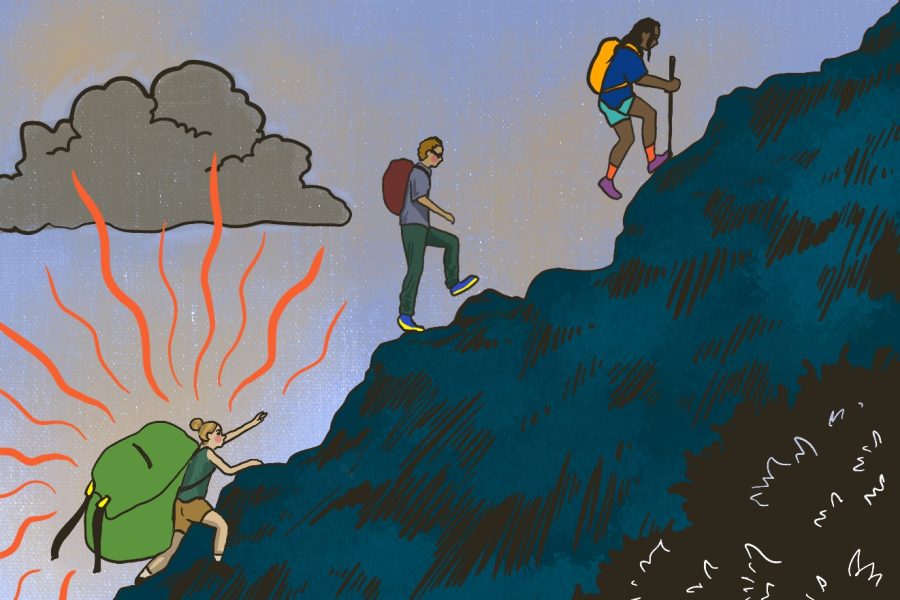Students need SAS’s support
September 12, 2022
The past four years I’ve been at UVM have been nothing short of eye-opening.
Years of observation have convinced me UVM’s support for progression and forward-thinking ideals is nothing but a facade.
Niche, a college ranking and review site, ranks UVM as the fourth most liberal college in America. However, in the past three years I’ve been here, I’ve both witnessed and felt the ignorance, complacency and simple disregard the administration has for its students and faculty alike.
Last spring was a time of political turmoil on our campus. From rallies over what many saw as the severe undercompensation of UVM staff to our broken Title IX office, I found myself attending some protest or another nearly every Friday when I got out of class.
I recall the feeling of utter sadness marching outside UVM President Suresh Garimella’s office with a picket sign, trying to justify the education I’m getting from what I view as an unjust administration—an institution my tuition is helping to fund.
Despite all this, I found something to bring me pride within the confines of our University: Student Accessibility Services. I even wrote a column praising the service that allows disabled students to have access to a fair education.
Some of the classroom accommodations SAS provides include peer note-taking, exam time extension, attendance flexibility, adaptive technology and assignment extension, according to the SAS FAQ website.
Attendance and deadline flexibility are some of the only reasons I have been able to succeed here at school with my disability.
Throughout my past three years on campus, I relied on these accommodations in order to protect myself and guarantee professors could not lower my grades for my inability to make it to the classroom or hand in an assignment on time.
So, it’s easy to imagine the disgust I felt when I received an email from SAS Program Director Sharon Mone informing students of changes made to two of my most vital classroom accommodations on Aug. 26, just two days before the start of my senior year.
SAS has decided to limit these accommodations to “one additional absence beyond the stated attendance policy without penalty” and “a 1-day (24-hour) extension to a limit of two out-of-class written assignments,” according to the Center for Academic Success website.
Prior to these changes, students with accommodations discussed and worked out a plan at the beginning of the semester with their professors. The plan of action included more flexible guidelines for if absences were necessary or assignments couldn’t be turned in on the deadline.
It is because of the accommodations SAS has historically provided that I have never failed to complete my assignments, maintain a high GPA, work at an internship and balance the day-to-day intricacies of my early 20s.
Now, in a class allowing two unexcused absences, the only difference between me and a completely able-bodied student is that I get three.
This would assume that I get only three migraines in the 15 weeks that we have class rather than the 15 migraines I actually get per month.
This would assume that on mornings when I wake up half blind and unable to speak, I show up to class ready to participate to the same degree as the student sitting next to me.
This would assume that on my third day of visual hallucinations and pain resembling getting shot behind the eye, I’ll be able to write that A+ quality term paper or take an exam.
Ultimately, the accommodation provided flexibility to meet the needs of students.
When I sent an email to the SAS offices asking to reinstate my accommodations as they were, I was told on Aug. 31 by my assigned counselor, that the reason for the changes was simply because of “administrative reasoning.”
In a Sept. 7 email exchange between myself as a student and Mone regarding the changes, Mone stated faculty no longer need to fill out forms in relation to students’ disability accommodations unless specifically directed to.
Do fewer forms to file really outweigh the detrimental effect this will have on students losing these accommodations? Do students’ stress, well-being and ability to succeed come second to the inconvenience of professors needing to fill out a few pieces of paper?
Perhaps it is a failure to understand the needs of students that has led to these changes and all of the anger that seems to be infiltrating our campus because of them.
Perhaps a total lack of empathy is to blame for why the administration can’t seem to comprehend that people with these accommodations in place don’t want to miss school or hand in an assignment late. Disabilities don’t alter to fit around someone’s work schedule.
Getting accommodations for a disability is not making a disabled person’s experience easier, it’s just giving disabled students the same leg up that abled students have in the first place, and are often unaware of.
I don’t think anyone who receives accommodations would choose to have them over being able-bodied if given the choice.
But that’s the catch: people who receive these accommodations do so because they live in a reality where choice is almost constantly impacted by a need to minimize damage and pain.
It’s hard to swallow the idea that in my last year of school, my GPA will likely plummet for reasons out of my control. It’s hard to get excited about a place that feels drastically less inclusive and empathetic than the one advertised to prospective students.
I am writing this column to gather my thoughts and ponder the possible reasons why the UVM administration would want to limit students’ access to a proper education. Perhaps if I fight hard enough, I will get my accommodations back as they were.
But I’m tired, and I can feel a migraine coming.
